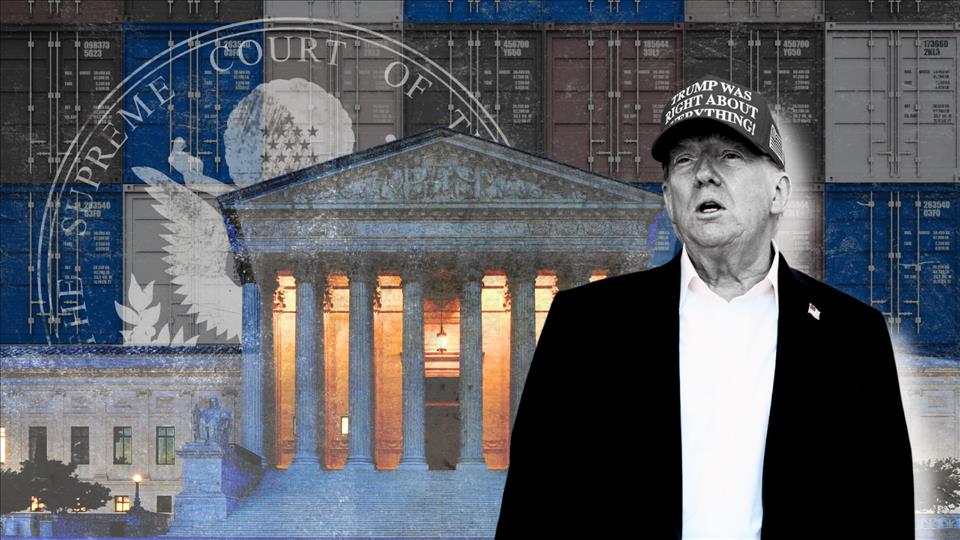Trump's Tariffs Are Headed To The US Supreme Court, Prolonging The Chaos On Trade
In a 7-4 majority, the judges ruled Trump had exceeded his power by invoking emergency powers to impose tariffs of“unlimited duration on nearly all goods from nearly every country in the world”, upholding an earlier court decision.
The ruling will throw into disarray the strategies of trading partners still in negotiations with the US, who may decide to wait and see the outcome of the legal battle.
Although there are different options available to challenge the decision, Trump has made it clear the next stop will be the Supreme Court.
The US Court of Appeals for the Federal Circuit said the tariffs would remain in place until October 14, to allow time for further appeals.
The power to tax rests with CongressThe ruling tested the limits of executive power under the International Emergency Economic Powers Act (IEEPA) from 1977. Trump is the first president to use this act to impose tariffs, setting the stage for a test of executive power. At least for now, it is a test the administration appears to have failed. The judges rejected Trump's interpretation, which they said would place no limit on the president to raise revenue without any authorisation from Congress.
Citing Article 8 of the US Constitution, the majority judgement unequivocally stated that“tariffs are a tax” and the power to tax under the Constitution rests with Congress.
In upholding an earlier decision by the Court of International Trade, the appeals court majority noted :
The tariffs are still in placeThere were two important outcomes from this latest decision. First, the“liberation day” tariffs are (currently) deemed illegal. Second, these“illegal” tariffs will temporarily stay in place to allow for the appeal options to be explored.
Revenue will continue to be collected under the executive orders in question. Should the tariffs be deemed illegal on appeal, that revenue may need to be returned.
This ruling does not apply to all tariffs. It doesn't cover specific sector tariffs such as those on aluminium and steel . However, other tariffs imposed during the first Trump presidency have already been ruled illegal under World Trade Organization rules and are currently the subject of appeal under the multilateral dispute settlement system.
The latest ruling would not reverse the decision to suspend the de minimis exception that caused global postage chaos. However, if the ruling is upheld, the rate of tariffs on low-value goods would revert back to pre-“liberation day” percentages. In many instances, this would mean back to zero.
What about the deals?Trading partners initially responded with panic to the unveiling of Trump's chaotic tariff agenda in April. There was a rush to meet with the president and make so-called deals. So what should governments of trading partners do now?
The most logical response might be to wait out the US legal process, because there may be no point in making deals if the tariffs are upheld to be illegal.
Unfortunately, this means continued uncertainty for business. On one hand, the courts may determine the tariffs are unlawful and must therefore be revoked. But Congress could subsequently move to reimpose tariffs with fresh legislation, or Trump could try other legal avenues .
The Constitution vs loyalty to TrumpIf the administration does decide to appeal to the Supreme Court, the important test will not necessarily be about tariffs but whether the US Constitution will continue to support the separation of powers .
The appeals court decision argues the IEEPA does not support the introduction of tariffs of the magnitude of the“liberation day” tariffs. What the IEEPA does allow is for the president to“regulate [...] importation”. However, the court suggested this phrase is nothing more than
Although the appeals court noted that such arguments have been rejected by the Supreme Court in the past, we will have to wait and see whether it is a“wafer-thin reed” that will become doctrine.
The Supreme Court has a conservative majority, with six of nine judges appointed by Republicans, including three in Trump's first term.
The Supreme Court has already granted the president immunity from prosecution in some circumstances. If the majority decides to allow these widespread and indefinite tariffs, they may be one step closer to creating an American monarch.

Legal Disclaimer:
MENAFN provides the
information “as is” without warranty of any kind. We do not accept
any responsibility or liability for the accuracy, content, images,
videos, licenses, completeness, legality, or reliability of the information
contained in this article. If you have any complaints or copyright
issues related to this article, kindly contact the provider above.
Most popular stories
Market Research

- Brazil Edtech Market Size, Share, Trends, And Forecast 2025-2033
- Vietnam Vegan Food Market Size, Share, Trends And Report 2025-2033
- Cryptogames Introduces Platform Enhancements Including Affiliate Program Changes
- Accounting And Bookkeeping Service Business Plan 2025: How To Start, Operate, And Grow
- USDT0 And Xaut0 Are Now Live On Polygon
- Global Open Banking Market 20252033: Services, Deployment & Distribution Trends






















Comments
No comment